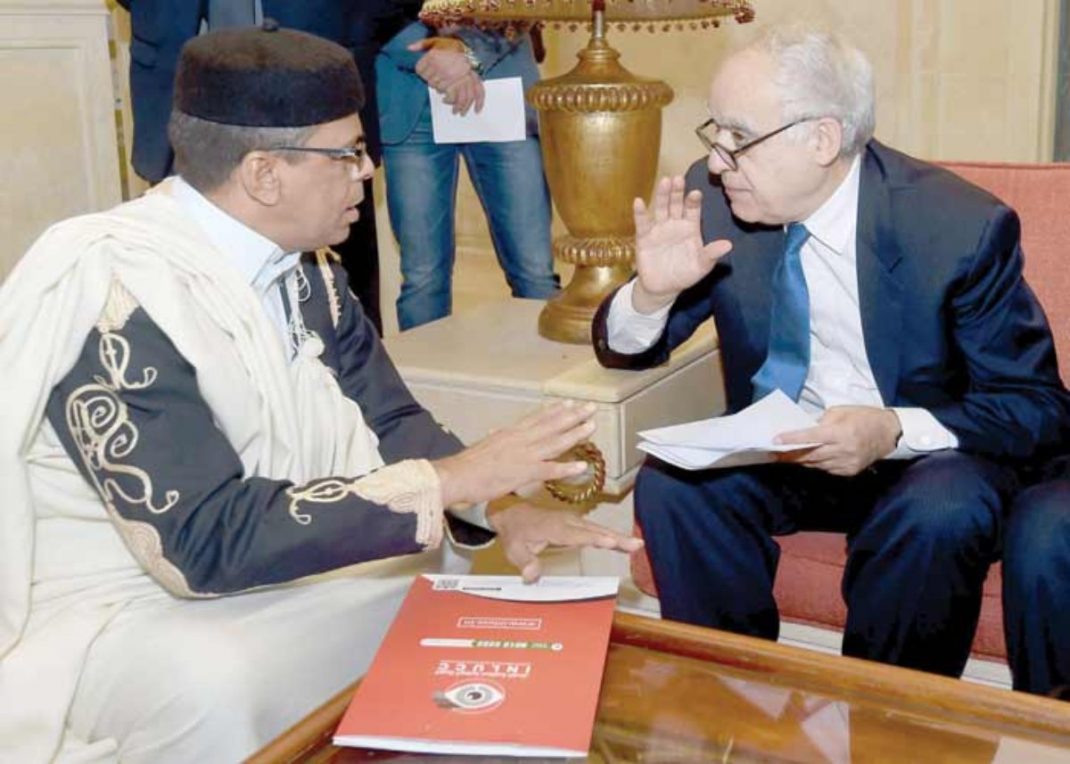By Lamine Ghanmi
In contrast to his predecessors, Salame has relied on a bottom-up approach to management, including as many Libyans as possible in the resolution process.
The United Nations has attempted to revamp Libya’s stalled peace process, bringing together rival factions and pushing the country towards reconciliation and elections after years of turmoil.
The endeavour, begun September 26 in Tunis, aims to end Libya’s conflict in one year. Libya has been engulfed in a civil war since 2011, when a NATO-backed uprising resulted in the overthrow and death of dictator Muammar Qaddafi.
The United Nations’ latest push for peace follows gains by anti- Islamist forces in the east, where most of the country’s oil wealth lies.
It also comes amid a months-long rift between Qatar, which stands accused of financing Islamist extremism, and a quartet of Arab countries led by Saudi Arabia.
The plan is the brainchild of newly appointed UN envoy Ghassan Salame, a Lebanese whose political approach is informed by his experience living through civil war.
A prominent Arab scholar, Salame has said Libya’s conflict was similar to many worldwide conflicts and crises he has studied. “There is no issue that Libyans could not overcome to restore peace and harmony,” he said.
Salame was appointed to his post in June, replacing German Martin Kobler, who had the job since November 2015. Spaniard Bernardino Leon had the post before him.
In contrast to his predecessors, Salame has relied on a bottom-up approach to management, including as many Libyans as possible in the resolution process rather than submitting a plan and then seeking their support.
“Libyans are tired of moving from one transition to another without a clear, explicit and reassuring horizon,” Salame told Libyan delegates at a meeting set to revise several articles of the December 2015 UN agreement reached in Skhirat, Morocco.
“We should all work together so they enter a stage of certainty and reassurance embodied only in a stable, capable and fair state. I have only expressed what I heard from the Libyans themselves,” he added, speaking in what he called “our beautiful Arabic language.”
“If I have a modest contribution, it would be synthesising the ideas of the Libyans and arranging them in a timetable I believe to be rational and appropriate,” he said.
Salame announced the “one-year action plan” September 20 at the United Nations.
The implementation began less than a week later with negotiations between delegations from rival factions. Representatives from the Tobruk-based House of Representatives (HoR) and the internationally recognised High Council of State based in Tripoli were in attendance.
The two bodies oppose one another as part of a broad political divide between eastern and western Libya. They also reflect divisions between political and social forces linked to the old regime and the Islamist-dominated political factions and militias that emerged after the demise of Qaddafi’s rule.
At their gathering in Tunis, Salame urged the camps to set aside their differences and quickly forge a resolution.
“There is a general insistence on a new approach, Salame said. “It is not another transition but rather a qualitative leap towards a capable, stable and dignified state. The action plan that we have put forward is only a crossing towards that aspired goal.
“The action plan, therefore, provides for a series of consecutive stages and we will work arduously to ensure there is no delay in the completion of any stage and that all are concluded with the normal end within a year from now.”
The delegates are expected to amend the Skhirat deal within a few weeks and convene for a conference on reconciliation within a month, Salame said after the event.
“The amendment of that agreement in our view is nothing but an entrance from which the majority of Libyans embark towards completion of the qualitative leap, which includes successive stages culminating in general, free and fair elections the results of which are accepted by all of us even before their organisation,” he said.
Salame gave no details on how the agreement was to be amended but delegates said amendments sought to trim the Presidential Council to three members — a president and two deputies — who will be tasked with supervising Libya’s transition to parliamentary and presidential elections and proposing a cabinet line-up of technocrats, who will work towards alleviating the country’s economic and social problems.
The 2015 deal received limited support from powerbrokers on the ground and was never endorsed by factions aligned with military commander Field Marshal Khalifa Haftar, who heads the LNA and controls eastern Libya.
The UN-backed Government of National Accord in Tripoli, headed by Prime Minister Fayez al-Sarraj, hamstrung by internal splits, has been unable to effectively counter powerful Islamist militias and criminal gangs or address the country’s social issues.
The HoR is expected to draft legislation for an electoral framework and for a referendum to approve a much-delayed constitution. The HoR, which has rarely convened over the last two years, has been bogged down by political infighting and a boycott by many of its members.
Making these institutions effective will be one of Salame’s primary focuses and crucial to reaching his one-year goal: “In Libya, there are dormant institutions that must be revived, split institutions that must be reunified and captive institutions that must be freed,” he said.
_______________




